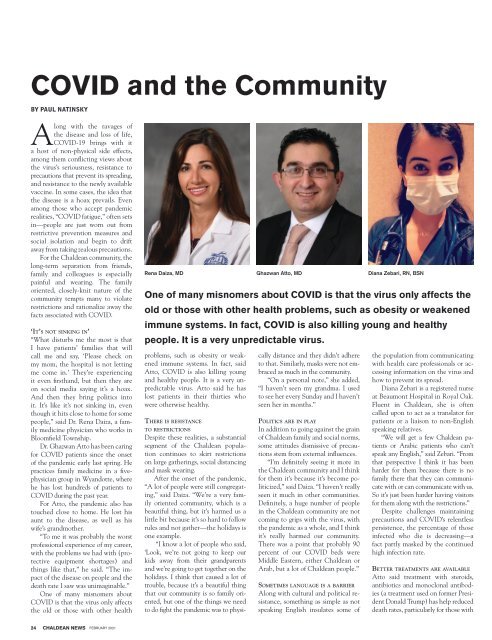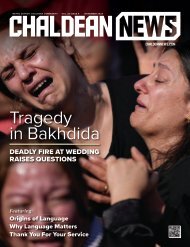FEBRUARY 2021
You also want an ePaper? Increase the reach of your titles
YUMPU automatically turns print PDFs into web optimized ePapers that Google loves.
COVID and the Community<br />
BY PAUL NATINSKY<br />
Along with the ravages of<br />
the disease and loss of life,<br />
COVID-19 brings with it<br />
a host of non-physical side effects,<br />
among them conflicting views about<br />
the virus’s seriousness, resistance to<br />
precautions that prevent its spreading,<br />
and resistance to the newly available<br />
vaccine. In some cases, the idea that<br />
the disease is a hoax prevails. Even<br />
among those who accept pandemic<br />
realities, “COVID fatigue,” often sets<br />
in—people are just worn out from<br />
restrictive prevention measures and<br />
social isolation and begin to drift<br />
away from taking zealous precautions.<br />
For the Chaldean community, the<br />
long-term separation from friends,<br />
family and colleagues is especially<br />
painful and wearing. The family<br />
oriented, closely-knit nature of the<br />
community tempts many to violate<br />
restrictions and rationalize away the<br />
facts associated with COVID.<br />
‘It’s not sinking in’<br />
“What disturbs me the most is that<br />
I have patients’ families that will<br />
call me and say, ‘Please check on<br />
my mom, the hospital is not letting<br />
me come in.’ They’re experiencing<br />
it even firsthand, but then they are<br />
on social media saying it’s a hoax.<br />
And then they bring politics into<br />
it. It’s like it’s not sinking in, even<br />
though it hits close to home for some<br />
people,” said Dr. Rena Daiza, a family<br />
medicine physician who works in<br />
Bloomfield Township.<br />
Dr. Ghazwan Atto has been caring<br />
for COVID patients since the onset<br />
of the pandemic early last spring. He<br />
practices family medicine in a fivephysician<br />
group in Wyandotte, where<br />
he has lost hundreds of patients to<br />
COVID during the past year.<br />
For Atto, the pandemic also has<br />
touched close to home. He lost his<br />
aunt to the disease, as well as his<br />
wife’s grandmother.<br />
“To me it was probably the worst<br />
professional experience of my career,<br />
with the problems we had with (protective<br />
equipment shortages) and<br />
things like that,” he said. “The impact<br />
of the disease on people and the<br />
death rate I saw was unimaginable.”<br />
One of many misnomers about<br />
COVID is that the virus only affects<br />
the old or those with other health<br />
Rena Daiza, MD<br />
problems, such as obesity or weakened<br />
immune systems. In fact, said<br />
Atto, COVID is also killing young<br />
and healthy people. It is a very unpredictable<br />
virus. Atto said he has<br />
lost patients in their thirties who<br />
were otherwise healthy.<br />
There is resistance<br />
Ghazwan Atto, MD<br />
One of many misnomers about COVID is that the virus only affects the<br />
old or those with other health problems, such as obesity or weakened<br />
immune systems. In fact, COVID is also killing young and healthy<br />
people. It is a very unpredictable virus.<br />
to restrictions<br />
Despite these realities, a substantial<br />
segment of the Chaldean population<br />
continues to skirt restrictions<br />
on large gatherings, social distancing<br />
and mask wearing.<br />
After the onset of the pandemic,<br />
“A lot of people were still congregating,”<br />
said Daiza. “We’re a very family<br />
oriented community, which is a<br />
beautiful thing, but it’s harmed us a<br />
little bit because it’s so hard to follow<br />
rules and not gather—the holidays is<br />
one example.<br />
“I know a lot of people who said,<br />
‘Look, we’re not going to keep our<br />
kids away from their grandparents<br />
and we’re going to get together on the<br />
holidays. I think that caused a lot of<br />
trouble, because it’s a beautiful thing<br />
that our community is so family oriented,<br />
but one of the things we need<br />
to do fight the pandemic was to physically<br />
distance and they didn’t adhere<br />
to that. Similarly, masks were not embraced<br />
as much in the community.<br />
“On a personal note,” she added,<br />
“I haven’t seen my grandma. I used<br />
to see her every Sunday and I haven’t<br />
seen her in months.”<br />
Politics are in play<br />
In addition to going against the grain<br />
of Chaldean family and social norms,<br />
some attitudes dismissive of precautions<br />
stem from external influences.<br />
“I’m definitely seeing it more in<br />
the Chaldean community and I think<br />
for them it’s because it’s become politicized,”<br />
said Daiza. “I haven’t really<br />
seen it much in other communities.<br />
Definitely, a huge number of people<br />
in the Chaldean community are not<br />
coming to grips with the virus, with<br />
the pandemic as a whole, and I think<br />
it’s really harmed our community.<br />
There was a point that probably 90<br />
percent of our COVID beds were<br />
Middle Eastern, either Chaldean or<br />
Arab, but a lot of Chaldean people.”<br />
Sometimes language is a barrier<br />
Along with cultural and political resistance,<br />
something as simple as not<br />
speaking English insulates some of<br />
Diana Zebari, RN, BSN<br />
the population from communicating<br />
with health care professionals or accessing<br />
information on the virus and<br />
how to prevent its spread.<br />
Diana Zebari is a registered nurse<br />
at Beaumont Hospital in Royal Oak.<br />
Fluent in Chaldean, she is often<br />
called upon to act as a translator for<br />
patients or a liaison to non-English<br />
speaking relatives.<br />
“We will get a few Chaldean patients<br />
or Arabic patients who can’t<br />
speak any English,” said Zebari. “From<br />
that perspective I think it has been<br />
harder for them because there is no<br />
family there that they can communicate<br />
with or can communicate with us.<br />
So it’s just been harder having visitors<br />
for them along with the restrictions.”<br />
Despite challenges maintaining<br />
precautions and COVID’s relentless<br />
persistence, the percentage of those<br />
infected who die is decreasing—a<br />
fact partly masked by the continued<br />
high infection rate.<br />
Better treatments are available<br />
Atto said treatment with steroids,<br />
antibiotics and monoclonal antibodies<br />
(a treatment used on former President<br />
Donald Trump) has help reduced<br />
death rates, particularly for those with<br />
24 CHALDEAN NEWS <strong>FEBRUARY</strong> <strong>2021</strong>

















